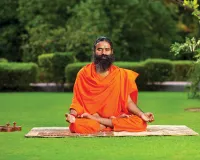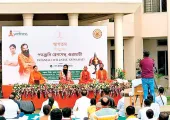Divinity through Charity
On

Mahamahopadhyay Dr. MahaveerU
Prati-Kulpati, Patanjali University
There is an interesting incident in the Vrihadaranyakopanishad, the three gods, humans and demons together went to the father Prajapati, after reaching there, all three lived following celibacy for a long time. After having lived celibately for a certain period, the gods prayed to Prajapati, now preach. Prajapati preached to the gods - 'D' and asked, did you understand?
The gods said, 'Yes, you have understood, you have given us 'damyat' i.e. 'Suppressing the desire' this preaching is given. Now men prayed, also preach. Prajapati also preached 'D' to them and asked, Do you understand? The human beings said, yes, understood, you have given us this instruction 'Datta' meaning 'Give alms.
Now the Asuras also prayed for preachings. Prajapati again preached 'D' and asked, understood? The demons said, yes, understood. You have taught us 'Dayadhvam' which means have mercy. Since ancient times, the preaching of charity, mercy and suppression of the senses has been done in this country and given the Guru-Shishya Parampara or tradition.
Maharishi Yasak while interpreting the word 'Dev' has said in Nirukta 'Devo Danadva Deepnadva, Dyotnad Va, Dyusthano Bhavatiti Wa.'
That is, the gods are those who always are of giving nature. From charity to divinity
is obtained. God is also called God because he keeps on giving to all the living beings of the world, not only gives us life, but he always provides whatever is needed for the protection of this life. Due to being a great donor, the name of Lord Shankar is 'Mahadev'. The meaning of 'Matridevo Bhava', 'Pitru Devo Bhava' and 'Acharya Devo Bhava' is also the same. Mother, father and guru never stop giving, that is why they are called gods. The great importance of Yagya has been told in Vedic culture - 'Yagno vai shreshtama karma' i.e. Yajna is the best act of the world. The word 'Yajna' is derived from 'Yaj' Dhatu, which means worship, association and charity.
The yajna is not successful without charity, such is the statement of the Acharyas, 'Mrityo Yajnastva Dakshinah'. While performing the Dev Yagya (Agnihotra), 'Swaha' is chanted with each offering in the Yagyakund. Swaha means surrender, giving.
When we chant 'Agnye Swaha', 'Indraya Swaha' and 'Rashtraya Swaha' etc., then our heart is filled with the sattvik feeling of giving reverently. The tradition of giving dakshina to a learned teacher, priest after every yajna and rites etc. also expresses this sacred spirit of charity. On the occasion of marriage ceremony, the bride's parents donate cows and daughters after being welcomed by the bride's side by providing them with aasan, arghya, honeypark etc. This is a very important moment in household life. The daughter who was pampered and nurtured, gave best education and best rites, affectionately hand it over to the groom with one's own hands and there is no shortage of milk, ghee, etc.
God has not sent anyone in this world to such a state that he cannot donate anything. Has been sent by giving something to every human being. A learned guru has been given abundant wealth in the form of knowledge. 'Vidyadhanam Sarvadhan Pradhanam' He gives the gift of knowledge to the disciple with a free heart. Sarveshameva dananam brahmadanam vishyate. Acharya adorns the life of his beloved disciple with the donation of wealth in the form of knowledge, and therefore has always been considered to be congratulatory and venerable.
The great glory of charity has been displayed in the Vedas – 'Shatahast Samahar, Sahasrahastasankir' which means earn with a hundred hands and distribute with thousands of hands. 'Kasyasvidhanam' This wealth which we call ours, it is not actually ours at all. Whose 'kasya' is then? The answer to this also lies in this. 'a' means that the form of happiness belongs to Prajapati only.
We are not its owner, but its trustee. Wealth is called Lakshmi. As Lakshmi is fickle, similarly wealth is also fickle. It does not stay in one place for a long time, but keeps on changing places, hence 'R' is derived from Gatau Dhatu. It is always appropriate to keep the meaning in motion.
The 117th hymn of the tenth mandala of Rigveda is - 'Praise of wealth'. The sages of this hymn say - 'Rayi: prnato nopadasyati' The opulence of the one who donates never diminishes - the wealth of a person who satisfies others by feeding them never diminishes. 'Priniyadinnadhmanaya', a charitable person should satisfy such a person who needs it with food, water etc. Someone has rightly said - 'Daridrayam praden tasmad danparo bhavet'. By not giving, a person becomes poor, so charity must be done. also said elsewhere
Godugdham Vatika Pushpam Kupodakam Dhanam.
Danad vivardhate nityam danach vinsayati.
Cow's milk, garden flowers, knowledge-knowledge, well water and wealth they grow by giving food etc. and they perish by not giving. This is called Arati Bhava. This arati sentiment is a big enemy of human beings.
Sometimes man thinks - I have abundance of wealth, if yes, then I will donate. I don't know when such prosperity will come to me. Therefore it is poignantly stated-
Grasadapi taddhan cha kasmanno diyate Arthishu l
Ichchhanurupo Hi Vibhavo Kada Kasya Bhavishyati ll
Even if you have a piece of grass, why don't you give half of it to the hungry. Because according to the wish, who has got wealth and splendor till date? Some Sanskrit poet has rightly said –
Gauravam prapyate danana tu vittasya sanchayat l
Sthiti Ruchchaiya Payodanam Payodhinamadhah Sthiti ll
Man attains glory by the donation of wealth and not by its accumulation. See. The position of the clouds that donate water is high and the position of the oceans that store water is low. It has also been said in the Rigveda, The Lord who is charitable, that is, God blesses him.
'Yadanga dashushe tvamgne bhadram karishyasi.' Rig.- 1.1.6
One of the synonyms of wealth is- 'Rayi'. This Ra grain is made of you. That is, the money which is given to others is ryi. He who is only for himself cannot be a rai. 'Kevalagho Bhavati Keoladi' means one who consumes himself alone Agh-eating is only eating sin. We pray to God every morning and evening - 'Vayam syam patyo rayanam' 'Agne naya suptha raye' Here we have prayed to God for the money that should be given to others.
Another synonym for wealth is 'Magh'. That is why the word 'Maghwa' is a signifier of the supremely opulent Indra. The word Magha has been derived by Yaskacharya - 'Maghmiti Dhan Naamdheyam' Mahterdan Karmanah. Here also the significance of money has been propounded by donation only.
The wealth which is dedicated to the service of others i.e. society, nation and humanity, that meaning is meaningful, otherwise it is useless. The description of three states of wealth is found in the Panchatantra composed by Pt. Vishnu Sharma.
Tisro gatiyo bhavanti Vitasya, Danam bhogo nashscheti l
Yo na dadati na bhukte tasya tritiya gatirbhavati ll
Charity, enjoyment and destruction are the three states of wealth. One who does not give charity and does not use the money received properly, the third movement of that wealth itself takes place. That is, that money itself is destroyed. The best form of wealth lies in charity.
The matter of importance is not how much wealth we have, how much knowledge we have. The importance of this is that out of the wealth and knowledge that we have received by our effort and by the grace of God, we have given to others. How much did you distribute? The word Vaitrani is derived from distribution itself. If you want to cross the river of the world, then the Vaitarni for that is to give charity.
In the history of the world, the names of those great men are engraved in golden letters – who sacrificed their body, mind and wealth with laughter to protect the country, caste, religion and humanity. The names of martyr Azam Bhagat Singh, Rajgaru, Sukhdev, Amar Shaheed Ramprasad Bismil, Chandrashekhar Azad, Netaji Subhash Chandra Bose, Lala Lajpat Rai, Chapekar brothers etc., who sacrificed their lives for the defense of the nation, can never be erased.
Purushartha means after religion in Chaturthaya. The money that is never lost, which is given in the interest of the nation or the nation. Can Bhamashah's name ever be erased? When Surya Maharana Pratap of Mewar, frustrated due to lack of money, started getting desperate, seeing the plight of his brave soldiers and sons etc., his heart started moving, then Bhamashah, the immortal son of Bharat Mata, placed his head at the feet of Rana ji and requested- O Sun of India! Whatever I have is given by mother to this land. Today there is a great need of this money to protect the land of this Mewar, so I offer this entire wealth, splendor at your feet.
As soon as this was said, the clouds of despair disintegrated and the sun of India again began to shine in the sky of the country in the form of Rana Pratap, and in the line of great men who gave donations, they were always in thick gold letters. The name of Bhamashah became immortal forever. Now some great donor appears before us, wes honored them as Bhamashah.
Maharishi Dadhichi gave his bones to build a Vajra to kill the Asuras. Maharaja Raghu gave all his wealth to Rishikumar Kauts, who had come to ask for crores of gold coins as dakshina to his Acharya Varanthu. In ancient times, Raghuvanshi king of that time and the successful emperor of Gupta dynasty, by performing big sacrifices at Prayagraj at the confluence of Ganga, Yamuna and Saraswati, used to take great pleasure in being Akimchan by donating all his wealth to the sages, scholars and the poor. .
When Netaji Subhash Chandra Bose called upon the countrymen for freedom, you give me blood, I will give you freedom. Then lakhs of young men and women of the country gave their whole life to the national sacrifice. Saubhagyavati women also gave good luck indicator mangal sutras. On 15 August 1947, the country became independent due to his great donation.
Today, lakhs of schools, colleges, universities, big hospitals, huge temples, dharamshalas, orphanages, ashrams, monasteries, temples are visible in our country, these are the result of charity. This selfless charity is the brightest form of charity. This is the meaning of human life. In common language it is said- 'Donate diya dhan na ghate', the more he donates, the more he increases.
All our ancient texts tell the glory of charity. There are three types of donations discussed in Shrimadgavadgita – Sattvik, Rajasic and Tamasic. Yogeshwar Shri Krishna has described the nature of Sattvik charity as follows -
Datavyamiti Yaddanam Deeyateanupakarine I
Deshe kale Cha Patre Cha Taddanam Sattvik Smritam II
-Shrimad Bhagavad Gita 16/20
This means that one has to give charity, thinking that the country, according to the time, to the deserving person, we will not get anything as a favor from him, the donation given in such a spirit is sattvik. In the poetry of poetry, the four types of heroes are included in the Rasa Prasang. That is why Lord Shiva, who gives nectar to others after consuming poison himself, gives poison. Maharishi Dayanand, who donated his life by giving a bag of money to Jagannath, is immortal forever.
Come ! We too are on the path of attaining divinity through charity.
Begin the journey.
Tags: patanjali patanjali wellness yog sandesh education india bharat university of patanjali bharat swabhiman patanjali yog samiti swami ramdev ji maharaj patanjali gurukulam acharyakulam patanjali research institute Acharya balkrishna patanjali yogpeeth patanjali yog sandfdesh yog gram yog guru haridwar devbhumi mahila patanjali yog samiti patanjali ayurvedic hospital Divinity through Charity
लेखक
Related Posts
Latest News
01 Nov 2024 17:59:04
जीवन सूत्र (1) जीवन का निचोड़/निष्कर्ष- जब भी बड़ों के पास बैठते हैं तो जीवन के सार तत्त्व की बात...









.jpg)










